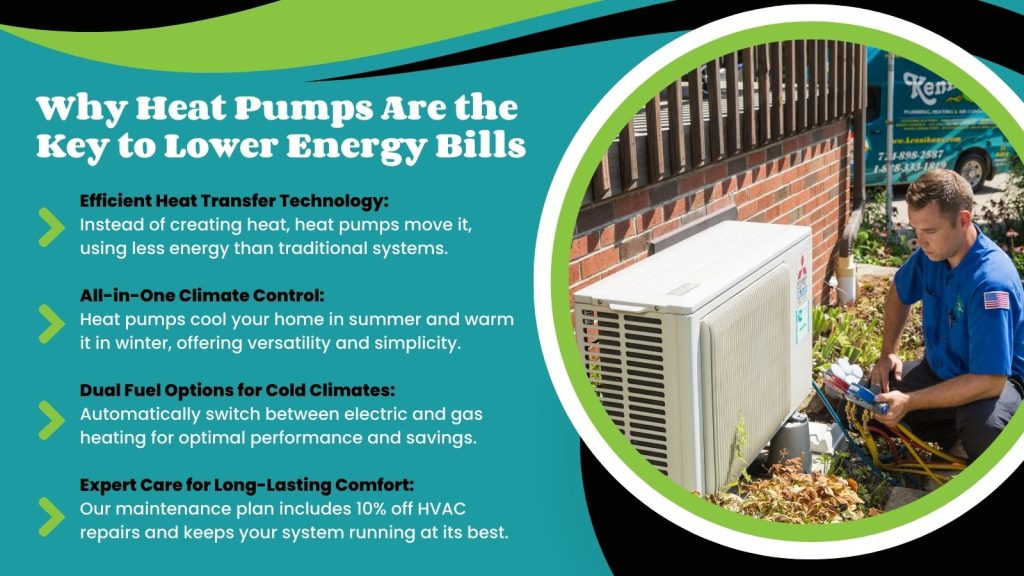A heat pump can help lower your energy bills while keeping your home comfortable all year. If you’re thinking about heat pump installation in Gibsonia, this is a great time to make the switch. Heat pumps offer an energy-efficient way to heat and cool your home without breaking the bank. At Kennihan Plumbing & Heating, Inc., we specialize in helping families enjoy affordable comfort with expert service and great offers, like a 10% discount on HVAC repairs with our maintenance plan. Homeowners may also qualify for a tax credit on new heat pump installations, which can further reduce your upfront costs and make energy-efficient upgrades even more affordable.

Introduction to Heat Pumps
Heat pumps are a modern, energy-efficient solution for both heating and cooling your home or business. Unlike traditional systems that burn fuel to generate heat, heat pumps work by transferring heat from one place to another. This makes them much more efficient, as they use less energy to provide the same level of comfort. Air source heat pumps are among the most popular options, drawing heat from the outside air to keep your indoor spaces comfortable year-round. For those looking for even greater efficiency, ground source heat pumps and geothermal heat pumps use the stable temperatures found underground to deliver reliable heating and cooling in any season. By understanding how heat pumps work and the benefits they offer, you can make a smart choice for your home’s comfort and energy savings.
Why Heat Pumps Save on Energy Bills
Heat pumps don’t generate heat. They move it from one place to another. This process uses far less energy than traditional heating systems. This process uses far less energy than traditional heating systems. Instead of relying on combustion, heat pumps use electricity efficiently. In contrast, traditional systems burn fossil fuels, resulting in higher emissions and a larger carbon footprint. Geothermal heat pumps are one of the most energy-efficient options available, using the stable temperature of the earth to provide reliable comfort year-round. This makes them one of the best options for energy-efficient heating.
In the summer, heat pumps act as an air conditioner by moving heat out of your home. During the cooling season, heat pumps move heat from your house to the outdoors. In winter, they bring heat inside. One system does it all, so you can heat and cool with less effort. This process of transferring heat is what makes heat pumps so efficient. If you’re looking for all-electric heating systems, heat pumps are the way to go. If you’re looking for all-electric heating systems, heat pumps are the way to go.
How does a heat pump HVAC system help lower energy bills?
Switching to a heat pump HVAC system can significantly reduce energy costs by moving heat instead of generating it. It uses electricity much more efficiently than combustion-based systems. In mild weather, an air-source pump heats or cools your home year-round; in colder conditions, a geothermal system taps the earth’s stable temperature to maximize comfort and efficiency. For hybrid climates, dual‑fuel setups pair a heat pump with a furnace: the pump handles the mild months, and the furnace takes over when temperatures drop, optimizing energy use and savings.
How Heat Pumps Work
A heat pump operates by moving heat rather than creating it, making it a highly efficient option for heating and cooling. The system uses a refrigerant that circulates between an indoor unit and an outdoor unit. In heating mode, the heat pump extracts heat energy from the outside air, ground, or water—even when it feels cold outside—and transfers it indoors to warm your home. When you need cooling, the process reverses: the heat pump absorbs heat from the indoor air and releases it outside, keeping your home cool and comfortable. This cycle is made possible by compressing and expanding the refrigerant, allowing it to absorb and release heat as needed. Heat pumps are considered energy-efficient because they transfer more heat energy than the electrical energy they consume. The efficiency of a heat pump is measured by its coefficient of performance (COP), which tells you how much heat energy is transferred for every unit of electricity used. This efficient process makes heat pumps a smart choice for both heating and cooling, helping you save on energy bills all year long.
What Are Dual Fuel Heat Pump Systems?
Want even more efficiency? Consider a dual fuel system installation. These systems combine a heat pump with a gas furnace. This combination is often referred to as a hybrid system, which is ideal for residential heating in regions with variable climates. In mild weather, the heat pump handles heating and cooling. When temperatures drop too low for the heat pump to work efficiently, the furnace takes over. This switch happens automatically, so you stay warm no matter the weather.
Dual fuel systems give you the benefits of both electric and gas heating. They also help you save money by using each system only when it’s most efficient. Regular dual fuel system maintenance keeps everything running smoothly and helps you avoid unexpected repairs.
Choosing the Right Heat Pump
Finding the right heat pump for your home or business starts with understanding your unique needs. Air source heat pumps are the most common and are well-suited for a wide range of climates and building types. If you’re looking for even higher energy efficiency, ground source heat pumps—also known as geothermal heat pumps—use the consistent temperature of the earth to provide heating and cooling, though they require more extensive installation. Modern heat pumps are now a practical choice even in areas with cold winters due to technological improvements. The right heat pump for you will depend on factors like the size of your space, your local climate, and your energy efficiency goals. It’s important to consult with a professional to ensure your heat pump is properly sized and compatible with your existing system. Choosing an energy-efficient model and making sure it’s installed correctly can lead to significant energy savings and a more comfortable home, all while reducing your environmental impact.
Keep Heat Pumps Efficient with Routine Maintenance
A well-maintained heat pump works better and lasts longer. Regular maintenance can prevent problems and keep your energy bills low. Proper insulation and air sealing of your home and duct system are important regardless of how you heat your home, but they are especially beneficial with heat pumps. Explore how HVAC maintenance can maximize your system’s performance and reduce the need for costly repairs down the line. Our certified HVAC technicians know how to keep heat pumps in top shape. They handle everything from heat pump repair to routine checkups. Maintenance includes inspecting and cleaning components like condenser coils and checking the expansion valve for proper operation. Advanced systems may include variable speed compressors, which require specialized maintenance to ensure optimal performance. Proper air sealing in the home is also important for maximizing the efficiency of your heat pump system.
With our maintenance plan, you’ll also save 10% on HVAC repairs. This plan keeps your system running efficiently and protects your investment. You can rest easy knowing your heating and cooling system is ready to go when you need it.
Costs and Incentives
The upfront cost of a heat pump system can vary depending on the type, size, and complexity of the installation. Air source heat pumps are generally more affordable, while ground source heat pumps tend to have higher installation costs due to the need for underground piping. Despite the initial investment, heat pumps are energy efficient and can lead to substantial energy savings over time, especially when replacing older, less efficient heating and cooling systems. Many homeowners and businesses can take advantage of financial incentives, such as tax credits and rebates, which help offset the cost of upgrading to a heat pump system. Homeowners can get a tax credit worth 30 percent of the cost to buy and install qualifying heat pumps, up to $2,000 a year. These incentives, combined with lower energy costs, make heat pumps a cost-effective and environmentally friendly choice for long-term comfort and savings.
Trusted Heat Pump Services in Your Area
We’ve been serving families for 50 years. From heat pump installation to heat pump replacement, we’ve seen it all. Our certified HVAC technicians bring extensive training and experience to every job. Whether it’s a quick repair or a full dual fuel system installation, we make it easy to stay comfortable.
We also offer 24-hour emergency service, so you’re never left in the cold. Our team treats every home like it’s our own. We focus on safe and healthy home systems, giving you peace of mind that your system is in good hands.
Ready to Save? Upgrade to a Heat Pump
Heat pumps are a smart way to lower energy costs and stay comfortable year-round. If you’re ready to learn more about heat pump installation, repair, or replacement, we’re here to help. See why so many homeowners are switching to all-electric heating options like heat pumps for long-term comfort and savings.
Contact us today for a free estimate. We’ll help you find the best solution for your home and budget. Let’s start saving together!
Frequently Asked Questions
Question: Why do heat pumps help lower energy bills?
Answer: Heat pumps don’t generate heat—they transfer it between indoors and outdoors using electricity, which is far more efficient than combustion-based systems. Geothermal models use the earth’s stable temperatures to provide reliable, energy-saving comfort all year long.
Question: What is a dual fuel heat pump system and how does it save money?
Answer: A dual fuel system combines a heat pump with a gas furnace. In milder weather, the heat pump handles heating and cooling. When temperatures drop too low for efficient heat pump operation, the furnace kicks in automatically. This hybrid setup ensures each system runs only when it’s most energy‑efficient.
Question: How does regular maintenance help heat pumps save energy?
Answer: Routine maintenance keeps a heat pump operating at peak performance, preventing issues and inefficiencies that drive up energy costs. Kennihan’s maintenance plan even offers a 10% discount on HVAC repairs, helping homeowners keep both energy bills and repair costs low.
We treat your home like it’s our grandma’s home! Contact Kennihan Plumbing & Heating, Inc. today for professional heat pump installation in Gibsonia.

